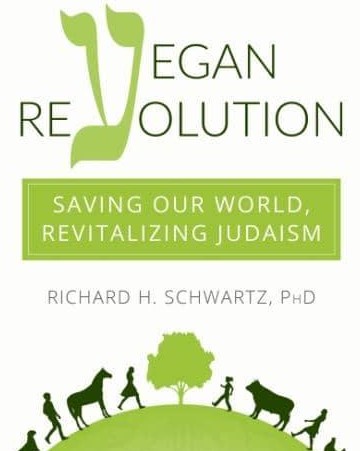2020 has been a unique year of challenges: coronavirus, climate change, human and animal suffering on a global scale, social justice issues…
And yet, amidst all these difficulties, one voice stands out with a solution which, if adopted, could be a roadmap to better solutions. Solutions that are both ancient and wise.
Where the twin pillars of Judaism and veganism meet lies many of the answers to our current woes.
In his new book, Vegan Revolution, Professor Richard H Schwartz discusses his vision of a world of new possibilities. A way to live in order to overcome these current problems and allow us to flourish.
Schwartz, author of a number of well-respected books including Judaism and Vegetarianism, is a long-standing patron of the JVS, having been a member, as a vegetarian since 1978 and a vegan since 2000.
He felt compelled to write this ground-breaking new work, Vegan Revolution, as a response to the growing threat of climate change. “Given the outsized role that animal-based agriculture plays in greenhouse gas production, habitat loss and food insecurity, the issue of veganism has never been more urgent.”
Richard seeks to align two beautiful fundamental principles: Judaism and veganism. “Veganism is the diet and lifestyle most consistent with basic Jewish teachings on preserving our health, treating animals with compassion, protecting the environment, conserving natural resources, feeding hungry people, and pursuing peace”.
He highlights a number of principles of Judaism which are relevant to today’s issues of climate change and animal suffering. Bal tashchit teaches us not to waste resources and tza’ar ba’alei chayim urges us not to inflict unnecessary pain on animals. However, modern-day intensive animal agriculture with its wasteful use of land, water and energy resources and cruel practices violates these principles and causes unnecessary suffering to animals and devastating consequences to the climate.
Schwartz points out that Israel could be vulnerable to climate change issues because of “higher temperature, reduced rainfall, rising sea levels, and extreme weather fluctuations.” Food shortages could also become an issue if the countries Israel relies on for imported foodstuffs were to experience severe weather and crop failures.
He states that the vegan diet is an ideal way to keep kosher. Not only that, but Israel is seeing a “meatless revolution,” leading to efforts to provide new, delicious, plant-based substitutes for animal products.
Regarding health, Schwartz highlights another important principle: Pikuah nefesh: the requirement to save a human life, a principle that is regularly being ignored.
Schwartz suggests that “physicians should put far greater emphasis on preventive medicine, advising their patients about dangers related to smoking, high-fat diets, and other lifestyle choices.”
Richard reminds us of the tremendous role a vegan diet can play in protecting health, resulting in “lower cholesterol levels… lower blood pressure, and lower rates of hypertension and type 2 diabetes…”
Another important theme in the book is that of animal rights, pointing out that in synagogues Jews say: “Nishmat kol chai t’varech et shim’chah”: “The soul of every living being shall praise G-d’s name.” Consistent with that statement, he advocates that people should wear natural or man-made materials instead of fur, wool or leather.
The Vegan Revolution was published at a most opportune time. With its emphasis on practical and spiritual ways to combine Judaism and Veganism to produce a real, long-lasting solution to climate change and other important issues, this volume is both timely, relevant and truly inspirational.
—
Thank you to JVS member Julie Rosenfield for this insightful book review.
Vegan Revolution: Saving Our World, Revitalizing Judaism written by Richard H. Schwartz PhD, was published by Lantern Publishing & Media 2020. You can read the book free of charge online here.



















